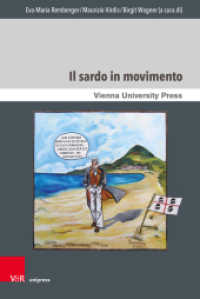- ホーム
- > 洋書
- > 英文書
- > Business / Economics
Full Description
Economists have long sought to predict how macroeconomic shocks will affect individual welfare. Macroeconomic data and forecasts are easily available when crises strike. But policy action requires not only understanding the magnitude of a macro shock, but also identifying which households or individuals are being hurt by (or benefit from) the crisis. A popular solution is to extrapolate the welfare impact of a shock from the historical response of income or consumption poverty to changes in output, by estimating an 'elasticity' of poverty to growth. Although this method provides an estimate for the aggregate poverty impact of a macro shock, it has limited value for analysts and policymakers alike. Aggregate numbers are useful to capture the attention of policymakers and the international community, but in the absence of any information on who is affected and to what extent, provide little guidance on what actions need to be taken. This volume outlines a more comprehensive approach to the problem, showcasing a microsimulation model, developed in response to demand from World Bank staff working in countries and country governments in the wake of the global financial crisis of 2008-09. Starting with the idea of using simple macroeconomic projections as the 'macro linkages' to a micro behavioral model built from household data, the model was conceptualized, refined and tested in a diverse mix of countries: Bangladesh, Philippines, Mexico, Poland and Mongolia. The results fed into country policy dialogue and lending operations of Bank teams, as well as various reports, research papers and briefs.







